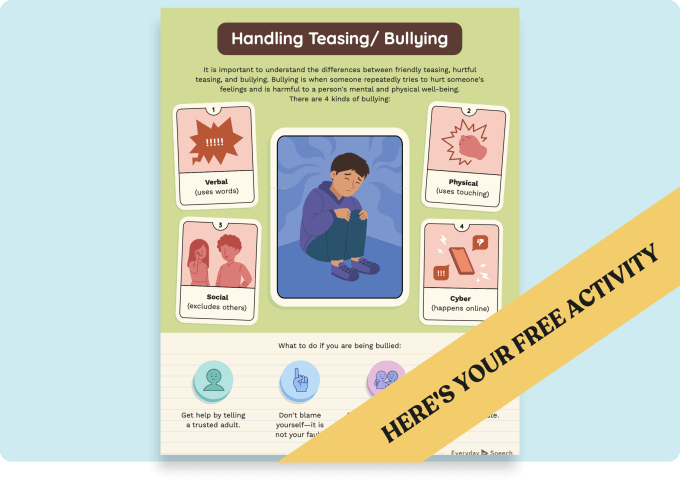Fork in the Road: Navigating Social Communication for High School Students
Get free social skills materials
No-prep lessons on self-regulation, emotional recognition, conversation skills, and more.
Sign up hereIntroduction
Social communication is an essential skill for high school students to navigate the complexities of social interactions. Developing effective communication strategies and understanding the impact of their words on others is crucial in forging strong relationships and resolving conflicts. In this blog post, we introduce you to Fork in the Road, a game that teaches students how to make better choices in social situations by analyzing the potential outcomes of their actions and deciding whether to think it or say it.
No-Prep Activity: Fork in the Road Game
This activity requires no preparation or materials from the educator. To play the Fork in the Road game, read the following scenario to your students:
Leah is talking to Rachel about her chorus performance when she reaches a social fork.
Rachel: I saw you at the chorus concert. Leah: Yeah. My brother is in the 7th Grade Chorus, so my family went. Rachel: Did you see my solo? I was so nervous. Do you think it went okay?
Leah: I didn’t think Rachel was very good during her solo. What should I say?
Leah is at a social fork. She didn’t really like Rachel’s performance. On one side of the fork, she could tell Rachel exactly how she feels. On the other side, she could focus on the things she liked about Rachel’s performance and keep the negative parts in her head. Ask your students to discuss the potential outcomes of each path and decide which one is the best choice for Leah.
Discussion Questions
- Why is it important to consider the feelings of others before speaking? How can this impact our relationships with peers?
- Can you think of a situation where you had to decide whether to think it or say it? What did you do, and what was the outcome?
- How can we determine when it is appropriate to express our thoughts and when it is better to keep them to ourselves?
- What strategies can we use to communicate our thoughts effectively, even when they might be critical or negative?
- How can practicing empathy help us make better choices in social situations?
Related Skills
Beyond the Fork in the Road game, there are other relevant skills that students can benefit from learning and practicing:
- Active listening: Developing the ability to focus on and understand the speaker’s message, ask clarifying questions, and provide appropriate feedback.
- Conflict resolution: Learning how to address disagreements constructively and find mutually beneficial solutions.
- Empathy: Cultivating the ability to understand and share the feelings of others, which can lead to more compassionate communication.
- Assertiveness: Balancing the need to express one’s thoughts and feelings while respecting the rights and opinions of others.
Next Steps
Now that you have a better understanding of the Fork in the Road game and its benefits, we encourage you to try this activity with your high school students. To further support their social-emotional learning, sign up for free samples of related skill-building materials at Everyday Speech. You’ll find a wealth of resources designed to help students develop effective communication strategies and enhance their interpersonal relationships.

